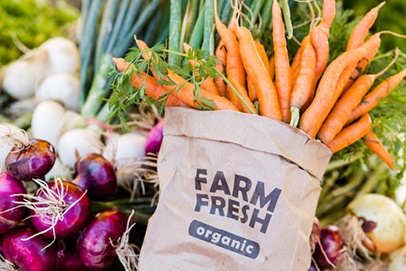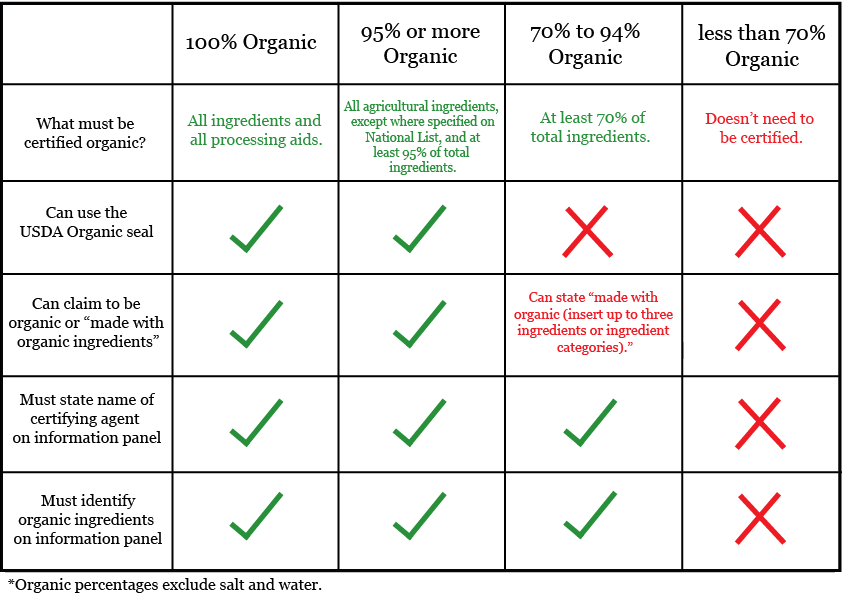The 4 Levels Of Organic Food Certification

Organic labeling claims are a great way to market your products’ unique attributes and value. But claims that misrepresent the product or fail to live up to the consumer’s expectations will not result in repeat sales or customer loyalty. When making such a claim, be sure all support for the claim is accurate, science based, supported, and verified.*
If you are having your retail food product certified organic, you’ll want to decide which level of organic certification your product will quality for and determine what your marketing/quality goals are.
There are four options for organic claims — two of them may use the USDA Organic Seal on their packaging, and two of them may not.
If your goal is to get the organic seal on your product and you find that not enough of your raw ingredients qualify, you’ll need to revisit your ingredient sources and internal packaging processes to determine how you can find the appropriate balance among quality requirements, prices, and marketing goals.
Levels Of Organic Certification
There are four levels of organic certification. You can tell the difference among these certification levels by the wording used on the outside of a particular product’s packaging:
100% Organic Certified
All ingredients and processing aids must be certified organic. These foods may use the USDA organic seal as well as the 100% organic claim.
This language implies that there is absolutely no chance of cross contamination with non-organic ingredients in the plant or at its source. All of this is documented, and special practices must be used in your facility to stand by this guarantee, which typically requires “organic only” production lines and/or entire plants.
Organic Certified
All agricultural ingredients must be certified organic, but the product can contain up to 5% non-organic content. These foods may use the USDA organic seal.
With this quality seal, 95% plus of the ingredients are grown organically. Many manufacturers use this organic seal option because their products may contain very minor ingredients that do not have an organic origin, or perhaps building a secondary “organic only” production line is not practical for the facility. Sharing production lines will result in your product being labled organic vs. 100% organic due to cross contamination concerns.
Made With Organic Ingredients
Contains at least 70% certified organic ingredients; the remaining 30% are not required to be certified organic, but also may not be produced using excluded methods. These foods may not use the USDA organic seal.
70% or more of the ingredients used in these products are certified organic. The remainder don’t have to be certified organic, but they do have to be “up to code” (they can’t be produced using certain methods not approved by the USDA). These organic products typically say “Made With Organic Ingredients” on the package and specify which ingredients are organic in the ingredient list.
Specific Organic Ingredients
Contains less than 70% certified organic ingredients. May list certified organic ingredients in the ingredient list. These foods may not use the USDA organic seal.
Less than 70% of the ingredients used in these products are certified organic. They may note on the front of their packaging that the product contains “specific organic ingredients” and in the ingredient list state which are organic and which aren’t.

Why verify organic certification levels?
Labeling mistakes can be very costly. Not only is there an associated financial risk as well as potential loss of reputation and consumer confidence, but misleading food labels can also lead to mass recalls that directly impact the bottom line.
Consumers need to trust your label when making choices about the product they put on their tables. When making an organic product claim, be sure all support for the claim is accurate, science based, supported, and verified. And that starts with your thorough understanding of the organic certification rules.
*Editor’s Note: four levels of certification were originally posted by Centra Foods; commentary has been added by Holly Mockus.
ABOUT CENTRA FOODS:
Centra Foods is a leading supplier of non-GMO, organic and healthy oils in bulk to natural food manufacturers. We partner with directly with oilseed farmers and producers around the globe and package all of our products in Kent, Washington, allowing us to offer competitive prices and prompt customer service. We are Kosher certified, USDA NOP Organic, Non-GMO Project Verified, and 3rd Party Audited with rail and co-packing capabilities.
{{cta(‘199d3fd0-b958-469f-8104-0689d541c449′,’justifycenter’)}}






